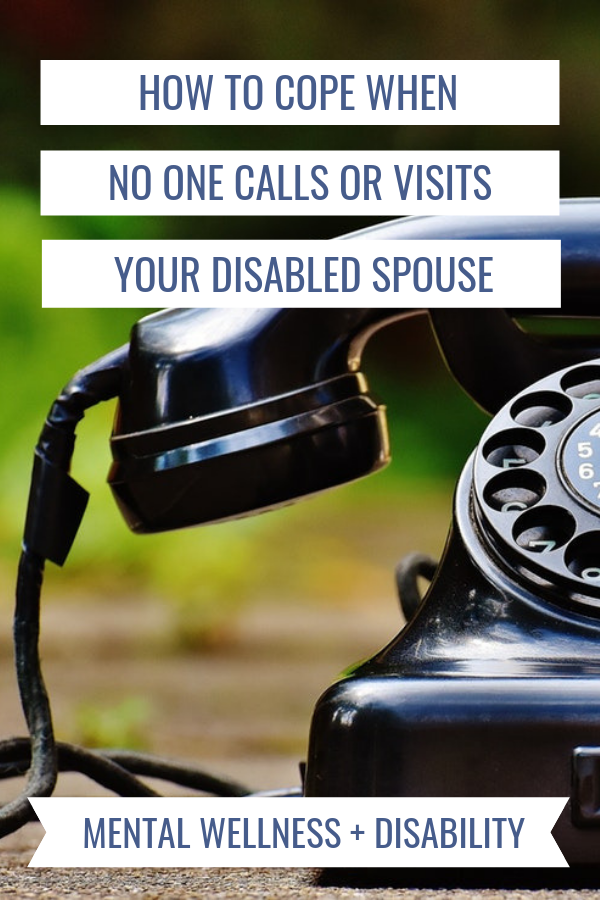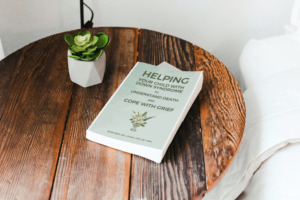When I meet with counseling clients who are caring for a disabled family member, they often say that no one calls or visits their partner. This leaves both the caregiver and their disabled partner feeling shocked and sad.
If you’re a caregiver, maybe you have felt similar disbelief. You would never have believed how friends and even family have abandoned your partner since their disability.
Maybe you have a story like many of my clients.
People called a lot at first. They offered prayers and support. Some showed up with meals.
Everyone asked what they could do to help. But because you were so tired and unsure of how to get through each day, you could never think of anything to say. Usually you just answered “we’re fine, we’ll let you know if we need anything.”
After your partner came home from the hospital or the rehab facility, maybe a few people came to visit. They didn’t stay long. The medical equipment, or the physical changes in your spouse, seemed to make them uncomfortable. They talked about things they’d do with your spouse. But those fishing trips and bowling nights never materialized.
Many of the people you thought would be regular visitors just never came. Now it seems like no one calls or visits your disabled spouse. The invitations to neighborhood events, trips to see old friends, and even family gatherings have stopped coming.
One day you woke up and realized that your partner’s whole social world shrunk. Now it’s just you, their new friends at therapy groups, and a handful of close family members.
Knowing that they’ve already lost so much, and fought so hard, it makes sense if you’re concerned about how this abandonment might make them feel.
You may worry that your loved one feels neglected by friends and family who don’t call. Keep reading to learn the number one thing to NOT do when you feel this, and what you can do instead.

DON’T give in to your desire to fill the void
I’ve worked with some very dear clients who were caring for a partner who acquired a disability. Some of these clients were bending over backward to fill the void left by friends who had disappeared.
One man started making crafts with his wife who’d lost her connection to a group of crafting friends. Those friends stopped calling after her foot amputation.
They seemed unsure of what to do or say now that she started using a wheelchair.
The man enjoyed doing something new and different with his wife. But he hated the glue on his fingertips and the glitter that embedded in his clothes. Mostly though, he hated seeing that his wife seemed sadder and sadder each time they sat down to do a project together.
Another woman I worked with was a quiet introvert, who loved quiet evenings at home reading with her cat in her lap. She pushed herself to go to a sports bar every Sunday to watch the Carolina Panthers with her husband. His old group of buddies stopped inviting him out to watch the games after his stroke.
My client hated the unpredictable loudness of all the TV’s and the cheering from fans in the bar. She felt deflated when, halfway through the season, her husband said he’d rather not go to watch the games anymore, because it just wasn’t as fun.
What these and many other caregivers have come to realize is this. It doesn’t make sense for you to try to fill the void left by those people who choose to no longer be in your partner’s circle.
In fact, watching you try to take on yet another role may make your spouse feel worse. They might feel that they are more of a burden.
As tough as it is to watch your spouse suffer with these social losses, know that the solution is not for you to ‘cover up’ for their missing friends.
Instead, read on for the best way to help your partner cope with the social void.
DO validate your spouse’s emotions
You may worry that naming and accepting your spouse’s sadness and feelings of being forsaken might make those feelings stronger. In fact, usually just the opposite is true. If it upsets your spouse that their friends are nowhere to be seen, it will help them to know that you understand why they feel that way.
It takes guts to say to someone who is suffering “Your friends used to be your strongest supporters, and now they don’t call to see how you’re doing. They don’t seem to want to spend time with you.” But this is just the kind of statement that gives them the strength to know that they can deal with it.
If you really want to show that you’re getting it, you can intuit your partner’s feelings. Add a statement like “I bet that’s making you wonder if they ever really cared.” Or “I wonder if you’re thinking about how things would be different if they were the one who was disabled.”
As a caregiver, the hardest part is to stop yourself at the ‘but’.
So to not add “But, we’re going to have a great time going to your niece’s wedding next weekend. It’ll be nice to see so many family members.”
Even if what you’re saying is true, and even though your goal is to lift your spouse’s spirits, this can backfire and make them feel worse. Without meaning to, when you try to lead them into more positive thoughts without showing that you understand why and how deeply they are hurting, you invalidate their pain.
Give your spouse the comfort of knowing that someone else sees and understands their suffering. Don’t make it your goal to ‘fix’ the problem of their feeling abandoned.
Your connection will be much stronger, and they will feel more cared for, if you can just make it your goal to show them that you get how devastating it is.
Keep reading
Other posts you may be interested in
Eight Tips to End Your Marriage with Dignity After Your Spouse Becomes Disabled
When your spouse becomes disabled, your whole world changes in an instant. The plans you’d made for the future all crumble away. Suddenly, your life feels like an endless stream of doctor’s appointments and therapy groups. It may feel like you know longer really know...












